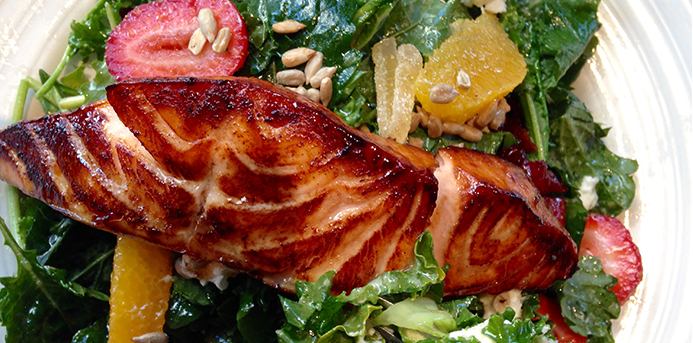What if you could train your brain to prefer healthy foods, like kale and cantaloupe, rather than unhealthy foods, like cookies and french fries? This may be possible, according to a 2014 study. Researchers at the Jean Mayer USDA Human Nutrition Research Center on Aging at Tufts University and at Massachusetts General Hospital demonstrated brain changes suggesting it is possible to reverse the addictive power of unhealthy food and increase the preference for healthy foods.
“We have carefully trained our brains to prefer unhealthy foods, high in fat, sugar and calories, by eating them time after time,” says Susan B. Roberts, Ph.D., director of the Energy Metabolism Laboratory at the USDA, and Professor of Nutrition Science and Policy at Tufts University. “This conditioning happens over time as we eat, repeatedly, what is out there in the toxic food environment,” Dr. Roberts reports. “Approximately 80 percent of women and 50 percent of men who struggle with their weight report food cravings.”
Dr. Roberts and her researchers studied the reward centers of the brain in 13 overweight and obese men and women. Eight of the participants followed a new Tufts-designed weight loss program, called iDiet. The other five were considered the control group. Both groups underwent brain scans (MRI) at the beginning of the study and six months later. At the end of the study, the brain scans for those in the weight loss group showed increased sensitivity to healthier foods and a decreased sensitivity to unhealthy foods in the reward center of the brain. While this is a small study, the results are promising for those who struggle with weight loss and food addictions. While the brain changes were recorded after six months, Dr. Roberts says, “In our weight loss groups we quite often have people say they feel their food preferences are changing after two weeks.”
For Paul Servais, of Arcadia, Wisc., his brain was retrained as he lost 75 lbs. “I used to crave steak, potatoes, things covered in butter, pizza, and cookies. Now I crave asparagus, beans, squash and blackberries.” Servais was introduced to the iDiet through the wellness program at his employer, Kwik Trip, Inc. The iDiet places an emphasis on behavior change, high fiber, and low-glycemic menu plans. At 291 lbs., Sevais was at his heaviest, but he was ready to take back his health. Together with his wife, they began cooking according to the diet, and the weight began to come off. “While I still look forward to my steak, I eat it infrequently and enjoy it much more now than I did.” Paul now finds unhealthy foods satisfying in much smaller amounts, and doesn’t feel the overwhelming urge to eat them. “I savor treats-eating them slowly,” he says.
Before the brain can be retrained to prefer healthy foods, one must consider the psychological aspects of weight loss. Alison Reynard Newman, Ph.D., of NorthShore University Health System, who counsels patients on the behavioral aspects of weight loss, says, “The reason why a lot of diets fail is because they don’t address the how. People need psychological skills to learn how to overcome unhealthy food addiction. We teach patients behavioral techniques they can use to enhance motivation for change, as well as identify and manage environmental triggers that cue eating.”
Some of the techniques Dr. Newman relies on include:
- Self-Monitoring of what, when and where you eat, along with thoughts and feelings you were experiencing while eating.
- Regular weight checks to develop a better relationship with the scale and acknowledge progress.
- Stimulus control by eliminating trigger foods in your home, desk drawer at work, etc.
- Identification of triggers that cause you to overeat.
- Meal planning to enable success and prevent hunger.
- Self-esteem and confidence building to help you tackle and manage the change.
Authors of the study agree that behavioral change was a key element to success for participants. Motivation was key for Servais, who says, “I was 100 percent ready to make a change for myself and my family.”
Positive behavioral change doesn’t have to be that difficult. Dr. Roberts says, ” I honestly don’t think it is too hard (to retrain your brain). If you consistently eat kale and salmon rather than candy and chips, you will love—and crave—the healthy stuff.”
If you are struggling to lose weight, and keep it off, this study should inspire you. Find a diet that seems manageable, consider behavior modification, commit for a few weeks, and retrain your brain to prefer healthy foods that nourish and keep your weight at the right number.
Enjoy this article? Find more articles about health & fitness here!

